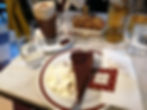THE FOODIE'S GUIDE TO VIENNA'S CAFES
- Wandering Welsh
- Jan 4, 2020
- 3 min read
While Viennese beisls and sausage stands indeed make Vienna worth a visit, the true gem in the Austrian capital’s culinary crown is in its cafes, a crucial part of Viennese tradition. These are extensions of people’s living rooms, where people relax, read and play cards over a coffee or cake – made to exceptionally high standards – and each have their own special something to offer. If you want to understand Vienna, the best way to do it is through its cafes. So which ones should you visit?
Café Museum
Operngasse 7, 1010 Wien. Open: 08:00 – 00:00 every day. Visit their website here.
Opened in 1899, this beautiful café just a stone’s throw from the Secession Building and Karlskirche was designed by Albert Loos and was popular with the likes of Gustav Klimt. With plenty of space to unwind and reasonable prices, this is a great place to relax in one of the trendiest parts of Vienna. Try their Mozart Torte, a chocolate pistachio cream cake, and their Mozart Kaffee, a double espresso with Mozart liqueur and whipped cream.

Café Hawelka
Dorotheergasse 6, 1010 Wien. Open: 08:00 – 00:00 Mon – Thu; 08:00 – 01:00 Fri + Sat; 10:00 – 00:00 Sun. Visit their website here.
Unmistakably Viennese, Café Hawelka was opened by Leopold and Josefine Hawelka in 1939 and it’s still run by the family, serving coffee and their characteristic buchteln desserts all day, every day in one of the cosiest places on earth. Make sure to try their buchtelns (sweet, jam-filled rolls made fresh), made to Josefine’s recipe to this day, and sip on a Wiener Melange – similar to a cappuccino.

Demel
Kohlmarkt 14, 1010 Wien. Open: 08:00 – 19:00 every day. Visit their website here.
Having opened in 1786, this historic cafe just down the road from the Hofburg palace has a long history of serving to the high society of Vienna, including Habsburg royals. The interior is simply beautiful with there often being large queues to get in. Despite this, the price is actually surprisingly cheap, with the waits also being very much worth it. You have to try their famous Annatorte, probably the nicest cake we’ve ever had and worth the trip to Vienna alone.

Café Sacher
Philharmoniker Str. 4, 1010 Wien. Visit their website here.
Arguably the most famous of the cafes in Vienna, Sacher is located in the Hotel Sacher and is the birthplace of the internationally renowned Sachertorte – a chocolate cake with apricot jam. The queues are long and is by no means an essential to get a feel of Vienna's cafes, but it is still worth it for the atmosphere alone. The prices are comparable to Demel, but if we had to pick between the two, we’d choose Demel every time.

Café Central
Herrengasse 14, 1010 Wien. Open: 07:30 – 22:00; opens 10:00 on Sun. Visit their website here.
Having opened in 1876 and located in a former bank, the beautiful vaulted ceilings of the café have stood over some of the most influential people in history. In January 1913 alone, Tito, Freud, Stalin, Hitler and Trotsky all frequented the establishment. It’s a great place to soak in the philosophical history of the city while enjoying one of their beautiful cakes – their Mozart cake is delicious. They also offer full meals for a reasonable price.

Café Gloriette
Schönbrunner Schloßstraße 47, 1130 Wien. Open: 09:00 – 18:00. Visit their website here.
Vienna is renowned for its palaces and cafes and Café Gloriette combines the two, located in a beautiful building in the Schönbrunn palace grounds with brilliant views over the city. They have a good selection of cakes and coffees, not to mention full meals.



